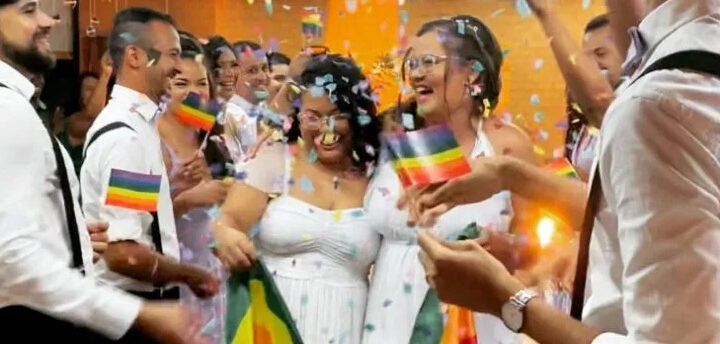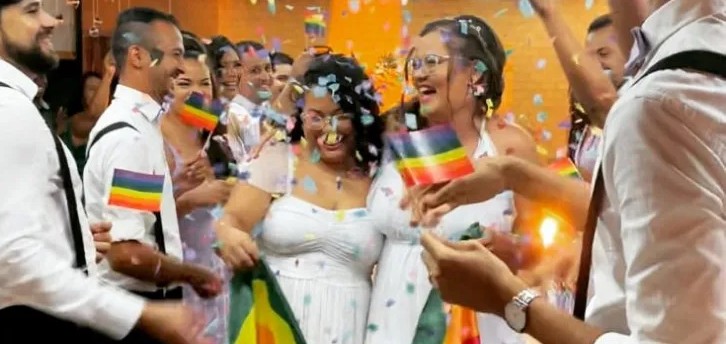A Baptist pastor in Brazil has received violent death threats after performing a wedding ceremony for two women Dec. 11.
Although same-sex marriages have been legal in Brazil for a decade, this was believed to be the first Protestant marriage ceremony uniting two women in the Brazilian state of Alagoas and the first in the country among Baptists.
Pastor Odja Barros is one of the few Baptist voices supporting the rights of Christian LGBTQ people in Brazil. Her church, the Baptist Church of Pinheiro, where her husband, Wellington Santos, is co-pastor, previously was removed from the Brazilian Baptist Convention because of its stance for full inclusion of LGBTQ Christians.

The wedding ceremony
Brazil is a traditionally conservative nation on LGBTQ issues, and Baptist leaders in the country are particularly against such inclusion. Southern Baptist Convention missionaries have exerted a dominant force on Baptist churches across Brazil for decades.
Barros was the first woman to preside over the Baptist Alliance of Brazil, the most progressive Baptist denomination in the country.
Several local Brazilian media outlets reported on the threats Barros has received, which also have been reported to police for investigation. Barros also has filed a complaint with the Secretary of State for Women and Human Rights.
Raimundo Barreto Jr., associate professor of world Christianity at Princeton Theological Seminary, is a friend of Barros and has spoken with her by phone since the threats surfaced. He confirmed to Baptist News Global the veracity of the other media reports.
As word of the same-sex marriage spread locally, Barros began receiving condemnations via social media, culminating in an explicit threat from someone claiming to be an evangelical Christian.

Pastor Odja Barros
“He said he was going to kill me, that he was going to shoot me in the head. He said he knows where I live and who the people close to me are,” Barros told media outlets. “This surpassed what I had been managing until then in terms of hate messages.”
The person making these threats also sent her photographs of a Bible next to a gun.
“He calls himself religious, Christian,” the pastor said of her tormentor. “He sent a photo with the gun and the Bible. This type of behavior has multiplied in this fundamentalist religious environment that we are living. We can no longer keep receiving this type of threats and say, ‘It’s fine.’ We need to react.”
Barros called this a human rights violation and said she and her church are being targeted “because of our faith.”
Her daughter took to social media to report on the threats, explaining that a “madman” had threatened to “shoot her five times in the head.” The man making the threats also sent audio recordings, along with the inflammatory photograph, saying he was monitoring Barros and her family.
“We are taking this seriously, even to demand and make visible this type of intolerance, which involves hatred, homophobia and misogyny,” Barros said. “He offends me in my position as a woman, pastor and theologian. These are offensive and absurd messages, terrible things.”
Her husband, Wellington Santos, added to the description: “Since 2016 we have been criticized for our work with minorities, even a personal campaign against us was carried out. But when it takes this proportion, that someone threatens to shoot my wife five times in the head, and mentions that he is monitoring my family, it makes us sure that we are living a barbarity. The debate should take place in the fields of ideas, when disagreements turn into death threats, this is a sign of that.”
“When it takes this proportion, that someone threatens to shoot my wife five times in the head, and mentions that he is monitoring my family, it makes us sure that we are living a barbarity.”
Violence and discrimination against LGBTQ persons is a daily reality in Brazil, according to a recent report in Open Democracy.
“Discrimination and violence against Brazil’s LGBTQ communities are widespread, yet often underreported,” the article noted. “In Brazil, LGBTQ people are disproportionately harassed and victimized precisely because of who they are. One reason is the deep strain of social conservatism in Brazilian society. Another is that Brazil is extremely violent: the country has the highest absolute number of homicides in the world, including many that are a result of hate crimes.”
In 2020, at least 150 transgender persons were murdered in Brazil, a 70% increase over the prior year. Brazil is considered to have the highest levels of violence against transgender persons of any country in the world.
Although federal and state officials do not keep accurate records on violence and threats against LGBTQ persons and their allies, Open Democracy reports that there are at least 22 known incidents per day, meaning nearly one every hour of every day.
That statistic was drawn from a study by the Oswaldo Cruz Foundation, which documented nearly 25,000 incidents of violence perpetrated against Brazil’s LGBQT population from 2015 to 2017.

Tuane and Erika
Another Brazilian publication gave the perspective of the two brides about the meaning of the ceremony to them. Tuane Alves is a gastroenterologist, and Érika Ribeiro is a customer service representative. Both are 29 years old. They had been dating for six years.
They chose Barros specifically to officiate their wedding “because they see in her a narrative of a very powerful and relevant woman in social struggles,” the publication reported.
“She brings with her the strength of the gospel and defends, in a very honorable and intelligent way, what she believes to be Christ’s proposal, which is also what we believe”, the couple said.
On social media after the ceremony, the couple said: “We are here spreading love, because we believe that it has the power to change the world. Appreciate the beauty of the world, appreciate the beauty of diversity.”
Related articles:
Brazilian Baptist church opens doors to gays
Scholar explores the ways migration changes people’s attitudes, beliefs and religion


